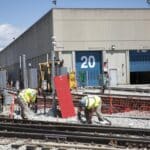
Report: Mass. Home to More Millionaires Despite New Surtax
Surtax supporters released data Monday that they said pokes holes in the argument that the state’s new tax on high earners is causing higher-income residents to move out of Massachusetts.

Surtax supporters released data Monday that they said pokes holes in the argument that the state’s new tax on high earners is causing higher-income residents to move out of Massachusetts.

Massachusetts accountants representing wealthy residents renewed their calls Wednesday for a bevy of tax reforms, including overhauling the “sting tax” on companies, to prevent the ongoing outmigration of Bay Staters and businesses.

The administration says the MBTA needs the $870 million to stay afloat and preserve progress made in the last two years, but “this didn’t look like equity or anything close,” two legislators say.

A pair of studies suggest the accelerating departures mean a state revenue bump from the Millionaires Tax will be relatively fleeting.

When Massachusetts voters passed the Millionaires Tax in 2022, there was an expectation that the funds generated by the 4 percent surtax on income over $1 million would help solve the problems in the state’s transportation sector, particularly with the struggling MBTA system facing an operating deficit.

A prominent think tank and two major business groups have teamed up to create a new lobby group that says it’s “aimed at promoting opportunity and improving competitiveness” in Massachusetts.

A new report published Tuesday by the left-leaning Massachusetts Budget and Policy Center suggests fears about outmigration are overblown or at least built on data that that points to “inconsistent” conclusions.

Accountants continue to sound the alarm over high-income residents leaving Massachusetts, in part to avoid the new income surtax that even the CPAs acknowledge has led to a “surge” in state tax revenues.

Talks are already underway between Gov. Maura Healey, state lawmakers and unnamed “stakeholders” about what kinds of taxes and fees are necessary to address a massive list of infrastructure needs at the MBTA, Healey said Thursday.
State legislators’ vote last week to send nearly $300 million from the Fair Share Amendment tax to public transit agencies is a step in the right direction, but two vital, additional steps must be taken in the coming years.

Without the short-term capital gains tax rate reduction favored by Gov. Maura Healey and the House, the Senate tax package “offers little” to offset the Fair Share Amendment tax hike on the wealthy, Eileen McAnneny said.
It is essential that this new source of revenue be used to strengthen transportation infrastructure, and RTAs are key in realizing a robust transit system that delivers for all residents.

The transit agencies that provide bus service to the hundreds of cities and towns across Massachusetts not covered by the MBTA would see a serious boost in funding under the state Senate’s plan to spend the first haul of funds from the new Millionaires Tax.

The sudden thud of collapsing state tax revenues echoed through the halls of Beacon Hill on Wednesday, inverting a projected surplus of hundreds of millions of dollars into a shortfall nearly as large and reshaping debate about government spending and tax relief plans.

More than three-quarters of Massachusetts residents support boosting funding for the state’s 15 regional transit authorities, which provide local bus and paratransit services beyond the reach of the MBTA.

If high-income households employ a legal tax avoidance strategy, the Massachusetts Budget and Policy Center says the state legislature should require that Bay Staters use the same filing status for their federal and state income taxes.

Just about two months before the first few dollars in extra income tax will begin to trickle into state coffers, the Legislative Regional Transit Authority Caucus is joining other transportation and education advocates in positioning their priorities to receive those funds.

Legal tax avoidance strategies – like structuring transactions in a way that minimizes reported taxable income or curtailing stock trading – could reduce the state’s Millionaires Tax revenue by about $670 million.

A clear majority of likely Massachusetts voters want the state legislature and Gov. Maura Healey to leave untouched the 1986 tax law that triggered nearly $3 billion in mandatory rebates last year, according to new polling results.

With the voter-approved surtax on Massachusetts’ highest earners set to start in the new year, Bay State accountants are already urging their clients to adapt.